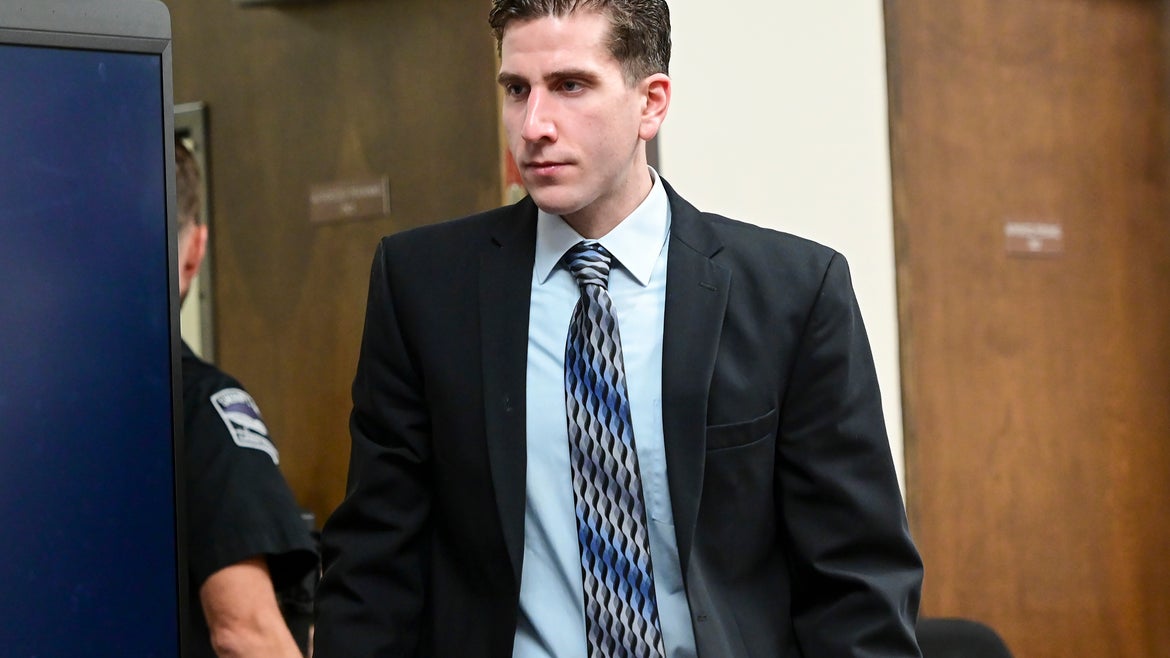"Mr. Kohberger has long had a habit of going for drives alone. Often he would go for drives at night. He did so late on November 12 and into November 13, 2022," Kohberger's public defender Anne Taylor says in a court document filed on Tuesday.
Bryan Kohberger says he was out driving alone on the night that four University of Idaho students were murdered in their home.
"Mr. Kohberger has long had a habit of going for drives alone. Often he would go for drives at night. He did so late on November 12 and into November 13, 2022," Kohberger's public defender Anne Taylor says in a document filed on Tuesday in Latah County Court.
She goes on to say that Kohberger "is not claiming to be at a specific location at a specific time" and that there is no "specific witness to say precisely where Mr. Kohberger was at each moment of the hours between late night November 12, 2022 and early morning November 13, 2022."
This new information comes after prosecutors filed a motion to compel in response to the alibi Kohberger filed last month in court, as is required under Idaho law.
In that motion, they requested the "specific place or places at which [Kohberger] claims to have been at the time of the burglary and homicides in this case" as well as the "names and addresses of all witnesses upon whom the Defendant intends to rely to establish such alibi."
This latest filing is the defense's objection to that motion to compel.
Taylor says that her client "has indicated he anticipates corroborating witnesses," but provides no specific names.
She goes on to say that corroboration of Kohberger's alibi "may be brought out through cross-examination of the state’s witnesses" or "expert witness presentation."
Kohberger submitted his alibi to the court last month, as is required under Idaho law ahead of a criminal trial.
"Mr. Kohberger’s defense team continues investigating and preparing his case," Taylor wrote in that court filing. "Evidence corroborating Mr. Kohberger being at a location other than the King Road address will be disclosed pursuant to discovery and evidentiary rules as well as statutory requirements."
The probable cause affidavit filed in December alleges that Kohberger's cell phone disconnected from the network just before 3 a.m. on the night of the murders and reconnected a little before 5 a.m. that same morning.
"At approximately 2:47 a.m., the 8458 Phone utilized cellular resources that provide coverage southeast of the Kohberger Residence consistent with the 8458 Phone leaving the Kohberger Residence and traveling south through Pullman, WA," writes Officer Brett Payne in the affidavit.
The phone was offline for almost exactly two hours at that point, according to the affidavit.
"The 8458 Phone does not report to the network again until approximately 4:48 a.m. at which time it utilized cellular resources that provide coverage to ID state highway 95 south of Moscow, ID near Blaine, ID," writes Payne.
Blaine is approximately 10 miles south of Moscow. Kohberger continued to drive south and then loop back north before arriving back in Pullman 36 minutes later, according to the affidavit.
Kohberger and his lawyers outlined what they believe to be the perceived holes in the prosecution's case in court filings last month, claiming in one brief that the DNA of three men was found at the murder scene.
The filing also claims that there is a "total lack of DNA evidence from the victims in Mr. Kohberger’s apartment, office, home, or vehicle."
Another piece of evidence that the defense says is lacking is the identification of the suspect's car.
Kohberger owned and drove a 2016 Hyundai Elantra.
"Precisely how the police came to believe the car was an Elantra is still unknown," Kohberger's attorney, Jay Logsdon, writes in one brief. "A report from an analyst for the FBI dated March 21, 2023 shows the analyst heavily relying on video of a car heading in the wrong direction and at the wrong time on Ridge Rd."
Prosecutors have yet to state a potential motive for the killings, but they do claim to have evidence showing that DNA found on a knife sheath left at the scene is a direct match to DNA obtained from a buccal swab of Kohberger.
While authorities believe a fixed-blade, hunting-style knife was used to kill the four University of Idaho students— Madison Mogen, 21; Kaylee Goncalves, 21; Xana Kernodle, 20; and Ethan Chapin, 20— it apparently has not been recovered.
Kohberger had previously told the public defender assigned to handle his extradition from Pennsylvania to Idaho that he expects to be exonerated of all charges at trial.
At his arraignment, a judge entered a not guilty plea on his behalf.
The trial is set to start later this year.
Related Stories











